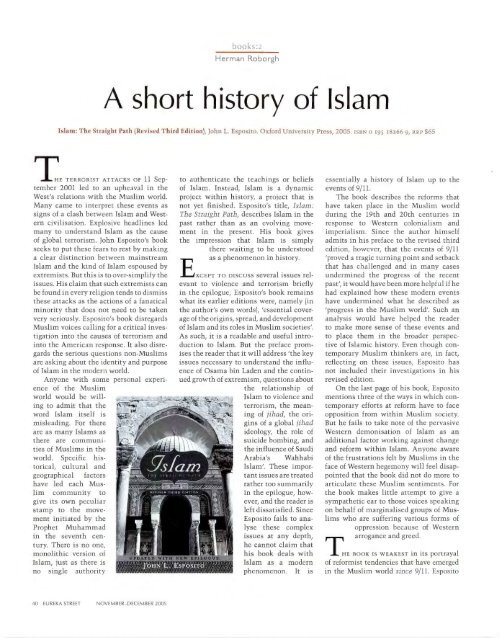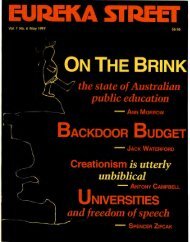0 - Eureka Street
0 - Eureka Street
0 - Eureka Street
Create successful ePaper yourself
Turn your PDF publications into a flip-book with our unique Google optimized e-Paper software.
ooks:2<br />
Herman Roborgh<br />
A short history of Islam<br />
Islam: The Straight Path (Revised Third Edition), John L. Esposito. Oxford University Press, 2005. r~BN o 195 r!h66 9, RRP $65<br />
T E TERROR"T ATTAC" m ll September<br />
2001 led to an upheaval in the<br />
West's relations with the Muslim world.<br />
Many came to interpret these events as<br />
signs of a clash between Islam and Western<br />
civilisation. Explosive headlines led<br />
m any to understand Islam as the cause<br />
of global terrorism. John Esposito's book<br />
seeks to put these fears to rest by m aking<br />
a clear distinction between mainstream<br />
Islam and the kind of Islam espoused by<br />
extremists. But this is to over-simplify the<br />
issues. His claim that such extremists can<br />
be found in every religion tends to dismiss<br />
these attacks as the actions of a fanatical<br />
minority that does not need to be taken<br />
very seriously. Esposito's book disregards<br />
Muslim voices calling for a critical investiga<br />
tion into the causes of terrorism and<br />
into the American response. It also disregards<br />
the serious questions non-Muslims<br />
are asking about the identity and purpose<br />
of Islam in the modern world.<br />
Anyone with some personal experience<br />
of the Muslim<br />
world would be willing<br />
to admit that the<br />
word Islam itself is<br />
misleading. For there<br />
are as rnany Islams as<br />
there are communities<br />
of Muslims in the<br />
world. Specific historical,<br />
cultural and<br />
geographical factors<br />
have led each Muslim<br />
community to<br />
give its own peculiar<br />
stamp to the movement<br />
initiated by the<br />
Prophet Muhammad<br />
in the seventh century.<br />
There is no one,<br />
monolithic version of<br />
Islam, just as there is<br />
no single authority<br />
to authenticate the teachings or beliefs<br />
of Islam. Instead, Islam is a dynamic<br />
project within history, a project that is<br />
not yet finished. Esposito's title, Islam:<br />
The Straight Path, describes Islam in the<br />
past rather than as an evolving m ovem<br />
ent in the present. His book gives<br />
the impression that Islam is simply<br />
there waiting to be understood<br />
as a phenomenon in history.<br />
E xCEPT TO orscuss several issues relevant<br />
to violence and terrorism briefly<br />
in the epilogue, Esposito's book remains<br />
what its earlier editions were, namely (in<br />
the author's own words), 'essential coverage<br />
of the origins, spread, and developm ent<br />
of Islam and its roles in Muslim societies'<br />
As such, it is a readable and useful introduction<br />
to Islam. But the preface promises<br />
the reader that it will address 'the key<br />
issu es necessary to understand the influence<br />
of Osama bin Laden and the continued<br />
growth of extremism, questions about<br />
the relationship of<br />
Islam to violence and<br />
terrorism, the m eaning<br />
of jihad, the origins<br />
of a global jihad<br />
ideology, the role of<br />
suicide bombing, and<br />
the influence of Saudi<br />
Arabia's Wahhabi<br />
Islam'. These important<br />
issues are treated<br />
rather too summarily<br />
in the epilogue, however,<br />
and the reader is<br />
left dissatisfied. Since<br />
Esposito fails to analyse<br />
these complex<br />
issues at any depth,<br />
he cannot claim that<br />
his book deals with<br />
Islam as a modern<br />
phenomenon. It is<br />
essentially a history of Islam up to the<br />
events of 9/l l.<br />
The book describes the reforms that<br />
have taken place in the Muslim world<br />
during the 19th and 20t h centuries in<br />
response to Western colonialism and<br />
imperialism. Since the author himself<br />
admits in his preface to the revised third<br />
edition, however, that the events of 9/ll<br />
'proved a tragic turning point and setback<br />
that has challenged and in many cases<br />
undermined the progress of the recent<br />
past', it would have been more helpful if he<br />
had explained how these modern events<br />
have undermined what he described as<br />
'progress in the Muslim world'. Such an<br />
analysis would have helped the reader<br />
to m ake more sense of these events and<br />
to place them in the broader perspective<br />
of Islamic history. Even though con <br />
temporary Muslim thinkers are, in fact,<br />
reflecting on these issues, Esposito has<br />
not included their investigation s in his<br />
revised edition.<br />
On the last page of his book, Esposito<br />
mentions three of the ways in which contemporary<br />
efforts at reform have to face<br />
opposition from within Muslim society.<br />
But he fails to take note of the pervasive<br />
Western demonisation of Islam as an<br />
additional factor working against change<br />
and reform within Islam. Anyone aware<br />
of the frustrations felt by Muslims in the<br />
face of Western hegemony will feel disappointed<br />
that the book did not do more to<br />
articulate these Muslim sentiments. For<br />
the book makes little attempt to give a<br />
sympathetic ear to those voices speaking<br />
on behalf of marginalised groups of Muslims<br />
who are suffering various forms of<br />
oppression because of Western<br />
arrogance and greed.<br />
T HE BOOK rs WEA KEST in its portrayal<br />
of reformist tendencies that have emerged<br />
in the Muslim world since 9/l l. Esposito<br />
40 EU REKA STREET NOVEMBER- DECEMBER 2005
















